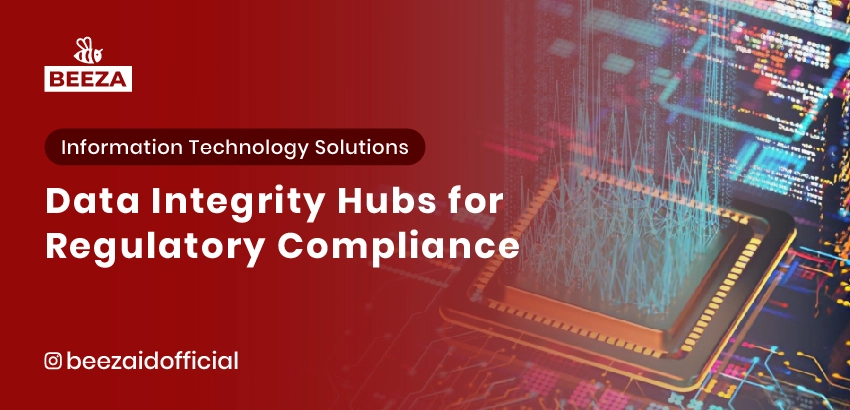
In industries like finance and healthcare, regulatory compliance is critical. Organizations must ensure that the data they manage is accurate, validated, and secure to meet industry regulations. One of the key solutions that help organizations achieve this is data integrity hubs.
What Are Data Integrity Hubs?
A data integrity hub is a centralized system that ensures the quality and consistency of data by managing and verifying its accuracy, integrity, and validity. These hubs are designed to consolidate data from various sources, enabling organizations to monitor and maintain regulatory compliance effectively.
Data integrity hubs play a vital role in industries requiring high data accuracy, such as finance, healthcare, and insurance. They facilitate the collection, management, and distribution of validated data, ensuring compliance with both internal and external regulatory standards.
How Data Integrity Hubs Enhance Regulatory Compliance
Data integrity hubs are essential for managing the increasing volume of data that organizations must handle while adhering to strict regulations. Here are some ways these hubs support compliance:
- Accuracy and Validation: These hubs verify data accuracy by cross-checking with reliable sources and performing real-time checks. This ensures that only validated and accurate information is used in decision-making processes, reducing the risk of errors or fraud.
- Centralized Data Management: By consolidating information from multiple systems, data integrity hubs make monitoring, auditing, and ensuring compliance more efficient. Centralized data reduces the likelihood of discrepancies between systems that can lead to compliance issues.
- Audit Trails: Regulatory requirements often demand clear audit trails to track the history of changes made to data. Data integrity hubs log every modification, providing a transparent record of who made the changes, when, and why. This is especially critical in finance, where transparency and accountability are paramount.
- Real-Time Monitoring: Data integrity hubs provide real-time monitoring, enabling organizations to detect non-compliance or risks promptly. This allows for swift resolution of potential issues, avoiding fines or legal challenges.
- Automated Data Quality Checks: With AI and machine learning, data integrity hubs can perform automated validations and error detection. These automated checks ensure that data remains accurate and compliant without the need for manual intervention.
Importance of Data Integrity Hubs in Regulated Industries
- Finance: In the financial sector, data integrity is crucial for maintaining customer trust and complying with regulations. Regulatory bodies like the Financial Action Task Force (FATF) and the Securities and Exchange Commission (SEC) require accurate and auditable data to ensure transparency and prevent fraud. Data integrity hubs help financial institutions meet these requirements by ensuring accurate financial transactions, customer information, and reporting.
- Healthcare: Patient data is highly sensitive and subject to strict regulations, such as the Health Insurance Portability and Accountability Act (HIPAA) in the US. Data integrity hubs in healthcare ensure the accurate recording and sharing of patient information while preventing unauthorized access, data loss, or errors that could impact patient care.
- Insurance: Insurance companies handle vast amounts of data related to policies, claims, and customers. Data integrity hubs ensure the accuracy of this information while complying with regulations like the General Data Protection Regulation (GDPR) and Insurance Act. This is essential for operational efficiency and avoiding legal repercussions.
Integrating Data Integrity Hubs with Other Systems
Data integrity hubs do not function in isolation. They need to integrate with systems like Customer Relationship Management (CRM), Enterprise Resource Planning (ERP), and Business Intelligence (BI) tools to ensure that an organization’s data remains accurate and compliant across the board.
Through integration, organizations can:
- Enhance data consistency across departments.
- Ensure accurate reporting and analytics.
- Simplify compliance processes with real-time updates across platforms.
The Future of Data Integrity Hubs
As regulations evolve and data volumes increase, the role of data integrity hubs will grow even more critical. The integration of artificial intelligence (AI) and machine learning (ML) will continue to enhance data validation processes, making them more efficient and precise. Furthermore, as more industries rely on cloud platforms, data integrity hubs will need to scale and adapt to support large, distributed systems.
Key Takeaways
- Data integrity hubs ensure data accuracy, validation, and regulatory compliance.
- They provide centralized data management, real-time monitoring, and comprehensive audit trails.
- In regulated industries like finance, healthcare, and insurance, these hubs help organizations meet stringent requirements.
- The use of AI and ML will further improve the efficiency and accuracy of these systems in the future.
Conclusion
Maintaining regulatory compliance is no easy task, especially in data-driven industries. Data integrity hubs provide the necessary infrastructure to ensure that organizations handle data in a way that meets legal standards and maintains stakeholder trust. With real-time monitoring, automated validation, and comprehensive audit trails, these systems play a crucial role in ensuring accuracy and compliance.
To learn more about how data integrity hubs can enhance your compliance processes, contact us today!